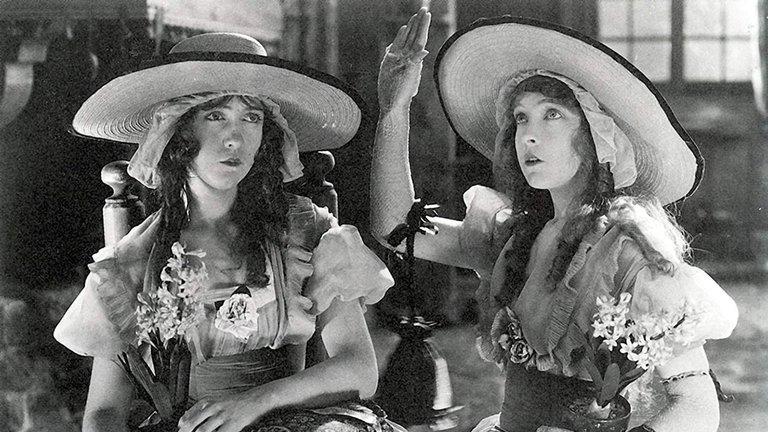Film Review: Orphans of the Storm (1921)

Most film makers, at least those that care about politics, are left-wing. One of the rare exceptions that went in the opposite direction is David W. Griffitih, giant of early cinema whose best known film The Birth of a Nation created controversies over its views that even in his times were considered to be extreme right. Griffith, despite that, generally avoided explicit expressions of his political views, but not so much in his 1921 silent period melodrama Orphans of the Storm, film that could be described as the first major anti-Communist work in history of Hollywood.
Griffith made his stance quite clear in the opening intertitles, in which he expressed displeasure with what Bolsheviks did during Russian Revolution and fear that the same horrors their supporters might bring to other countries, including United States. He envisioned his film as a cautionary tale about what happens during revolutions, although the plot, based on the popular 1874 stage play Les Deux Orphelines (“Two Orphans”) by French authors Adolphe d’Ennery and Eugène Cormon, takes place more than a century earlier, in France. Title characters are two young women who grew up together despite belonging to different classes in pre-revolutionary France. Louise (played by Dorothy Gish) is a daughter of commoner and aristocratic Countess de Linières (played by Catherine Emmet) whom Countess’ parents, out of shame, took away and left on the street, only to be picked by another commoners family and later grow up as adopted sister of Henriette Girard (played by Lilian Gish). The family was struck by plague that took away both parents and made Louise blind, so Henriette takes her to Paris to find a doctor to cure her. Along the way Henriette gets abducted by lustful Marquis de Praille (played by Morgan Wallace), but is rescued by valiant Chevalier de Vaudrey (played by Joseph Schildkraut). Unfortunately, Louise got lost only to be picked by Mother Frochard (played by Lucille de Verne), grotesque woman who tries to exploit her and force her into life of street begging. Henriette’s efforts to find her Louise coincide with political friction that would lead to French Revolution, a chaotic event during which Henriette and de Vaudrey would find themselves under the shadow of guillotine.
Popularity of Les Deux Orphelines was reflected in relatively large number of early film adaptation, including at least seventh preceding Griffith’s, including Dvije sirote, 1918 film made in today’s Croatia, which is, like entirety of silent Croatian cinema, lost. Griffith in his script added contemporary political commentary, drawing obvious parallels between excesses and anarchic violence of French Revolution and Russian Revolution. Famous historical personalities were added to the plot, namely the vile power-hungry and tyrannical Lenin-like Robespierre (played by Sidney Herbert) and his fellow revolutionary, but more noble and moderate Danton (played by Monte Blue), whose views, at least those depicted in the film, match Griffith’s. But the audience was less interested in politics and history and more in old-fashioned melodrama, and this is what Griffith delivered helped by his muse Lillian Gish in another grand role that employs her beauty and expressive big eyes. That was her last collaboration with Griffith and the last film in she appeared with her sister Dorothy Gish, another great silent era star. Orphans of the Storm also represented Hollywood debut of Austrian actor Joseph Schildkraut who would later, during sound era, become one of the specialists for character roles. Griffith has spent relatively large budget in the film and successfully reconstructed 18th Century Paris, although it could be argued that his directing technique wasn’t particularly innovative, which is especially evident during the scene near the end, when protagonists are going to be rescued from execution in last minute, very much like in similar scenes in The Birth of a Nation and Intolerance. Although critics weren’t too enthusiastic, audience was and Orphans of the Storm became a hit. It is, however, not considered to be among the top of Griffith’s work. Ironically, the very Bolsheviks he had attacked in this film would later in the decade not only praise Griffith but actually use him as inspiration to build Soviet cinema.
RATING: 6/10 (++)
_
Blog in Croatian https://draxblog.com
Blog in English https://draxreview.wordpress.com/
InLeo blog https://inleo.io/@drax.leo
InLeo: https://inleo.io/signup?referral=drax.leo
Unstoppable Domains: https://unstoppabledomains.com/?ref=3fc23fc42c1b417
Hiveonboard: https://hiveonboard.com?ref=drax y
Bitcoin Lightning HIVE donations: https://v4v.app/v1/lnurlp/qrcode/drax
Rising Star game: https://www.risingstargame.com?referrer=drax
1Inch: https://1inch.exchange/#/r/0x83823d8CCB74F828148258BB4457642124b1328e
BTC donations: 1EWxiMiP6iiG9rger3NuUSd6HByaxQWafG
ETH donations: 0xB305F144323b99e6f8b1d66f5D7DE78B498C32A7
Posted using CineTV
